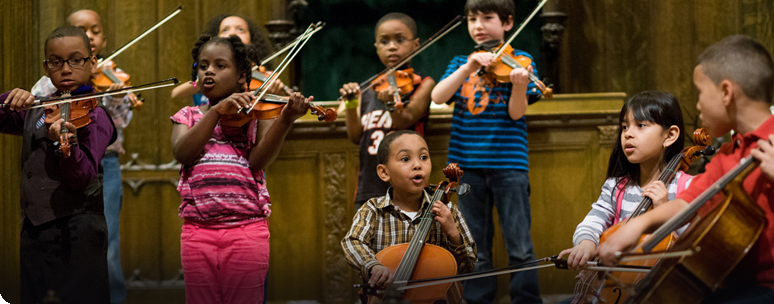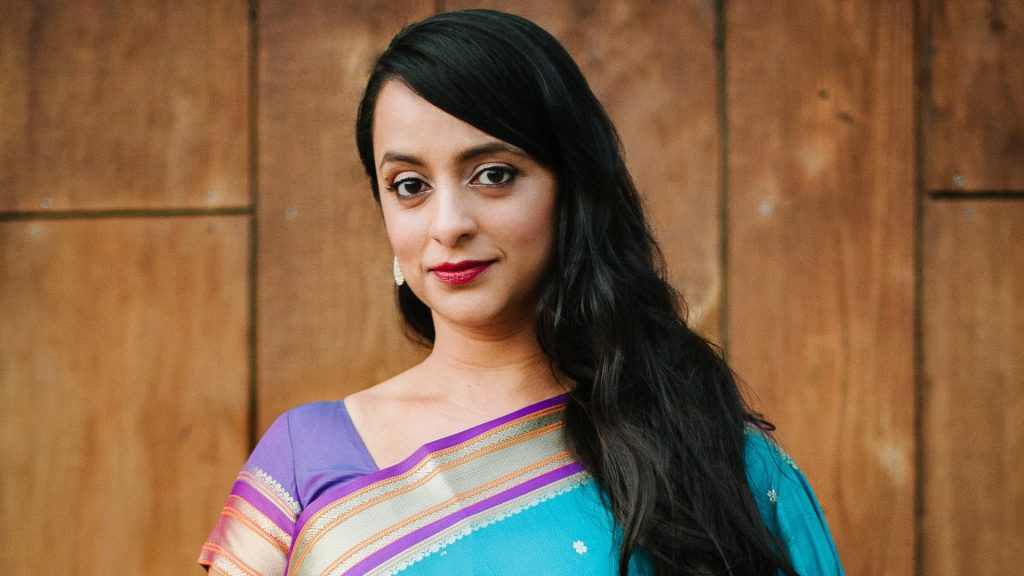“I Want People to Have a Visceral Response.” Talking with Reena Esmail
This week, CMW welcomes composer Reena Esmail to the organization for a week-long residency that includes a Q&A lunch on Wednesday and the End-of-Year Student Gala on Friday. Jill Pearlman talked with the composer in anticipation of her visit to CMW. *** One of Indian-American composer Reena Esmail’s secrets is that she keeps a dizzying number of conversations going simultaneously, somehow making it look easy. Not just dialogs between sitar and harpsichord, but also between orchestra and the street, between Hollywood and Bollywood. She does the intricate thinking to meld these layers but wants us to enter with our emotions first. On first hearing her music, I felt some déjà vu, as if the music stemmed from a vast ocean of origins, and those echoes, resonances and combinations have always existed – but where? There are secrets to these compositions that Esmail holds and keeps to herself – graciously rolling them out little by little as we immerse in her lush, often provocative project. Rigorously trained in the classical western schools, at Juilliard and Yale, Esmail had been looking for ways to step out of boxes, closed systems, assumptions. “I think people overintellectualize music,” she says. “Professional musicians have been trained to experience things in an exact way. When you take some of those things away, people are forced to read their own intuitions and emotions. I want people to have a visceral response. I’m trying to tap into a third rail of emotion.” Esmail’s third rail involves not shock and confrontation, but invitation and seduction. In her words, when having intercultural conversations, “I’m inviting others to be uncomfortable in the most comfortable way.” Her personal mélange of cultures could be infuriatingly confusing. Esmail, 41, was raised in Studio City, Hollywood. Her parents were “super weird” — although both Indian, her mother was raised in Kenya and her dad in Pakistan, eleven languages between them but English the only one in common. The school scene meant being immersed in movie and pop culture, Spice Girls and Alana Morrisette the backdrop to hanging out with friends whose parents were stars. Bollywood was a rare nod to Indian music heard at home. She gravitated to Western classical music and pursued a career path, entering Juilliard as an undergrad. As a budding composer, she felt challenged by the priority of Western harmony, and found herself intuitively drawn towards melody. A year-long fellowship in India when she was 22 filled out pieces of that puzzle – she felt immediately at home in Hindustani composition, the northern Indian classical tradition, and began to study similarities and differences. A well-known 2018 composition, “Darshan,” for instance, is based on the Bach partita. It flows so beautifully that before you know it, you’re wondering if Bach used those rich textures, that lyrical, head-rolling rhythms, the darkness and lightness. “It works between sensibilities, taps into new western music style with texture coming in the forefront than background,” says Esmail. “A lot of the surrounding texture approximates a drone. The warmth and buzziness of Indian instruments are similar to elements of baroque music.” (It was featured in the New York Times’ piece, “Five Minutes That Will Make You Love the Violin.”) The acclaimed violinist known for this exquisitely expressive piece is Vijay Gupta, Esmail’s husband of four years. Also born in American to Indian immigrants, Gupta had been deeply involved with Bach’s sonatas and partitas, so he commissioned Esmail’s piece before the two were married. Another shared interest: expanding the classical music world’s narrow reach, in setting, audience and power structures. In 2010, Gupta founded Street Symphony, a Los Angeles-based project established to play music for and with people on Skid Row, in prisons and in shelters. The work has been appreciated and lauded, establishing community and fortifying Gupta’s urgency of being a “Citizen Artist.” Gupta is artistic director, and Esmail was the resident composer in 2016-2018. Being an artist, Esmail says, means “putting ourselves in service of bigger questions. We don’t spend enough time thinking about them.” Her answer has been to create work that connects, rather than divides. Similar to the commitment of Community MusicWorks, Esmail says, “this is not outreach, not a thing that is a separate thing from music making. This is not that different in terms of interaction. We meet people where they are emotionally. That’s the job of artist.” Lately this has meant asking herself how to write music that engages youth. Over the years, her compositions for young musicians have expanded one hundred percent. She has written a band piece for high school band, children’s piano and choral pieces with Oxford University Press, written for student ensembles. “Professional music making, we don’t value enough educational music making. If you hadn’t played Bach’s Minuet in G as a student, would you value St Matthew Passion as an adult?” Add to that Esmail’s much anticipated guest residency at CMW, May 14-17. She will be testing out some of her compositions, such as “Twinkle Twinkle” with Hindustani rhythms, on a tough audience, the kids: “It will be a clear litmus test. A child doesn’t owe you anything!” The workshops will culminate in the End-of-Year Student Gala, May 17th at the Lindemann Performing Arts Center, where CMW staff and student musicians will celebrate by playing an Esmail program. Watch for “Concerto for You,” a piece which embodies Esmail’s commitment to minimize hierarchies within an orchestra; the soloist, Minna Choi, will circulate and trade on and off with student musicians. The moving conclusion embodies Esmail’s concept that this concerto is for “you.” You who? Gupta, her husband, asked if it was for him. Esmail turned him down and pointed to the musicians. The musicians will gesture outward from the stage –consider yourself invited, this happening is made for you. — Jill Pearlman Jill Pearlman worked as a music and arts journalist in New York and France for over a decade. Now mainly a poet, writing at the edge of music and words, she lives in Providence and is a massive CMW fan. Her work can be seen at jillpearlman.com. Join us for these two events: A Conversation and Lunch with Composer Reena Esmail End-of-Year Student Gala
|

